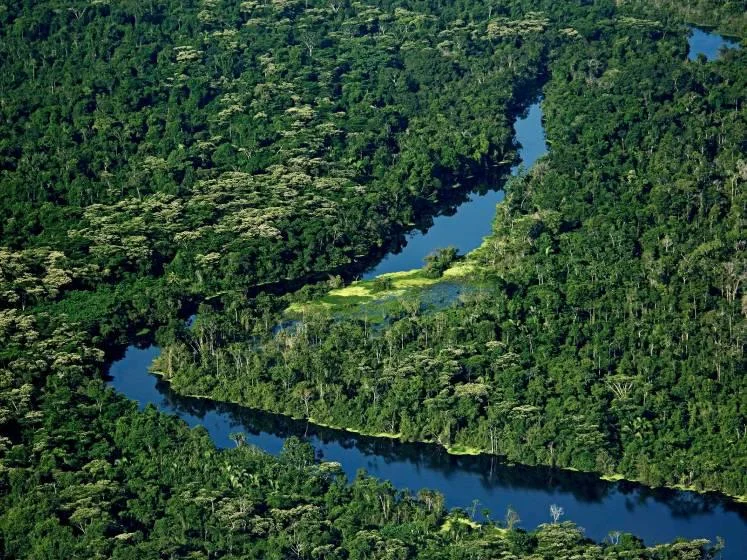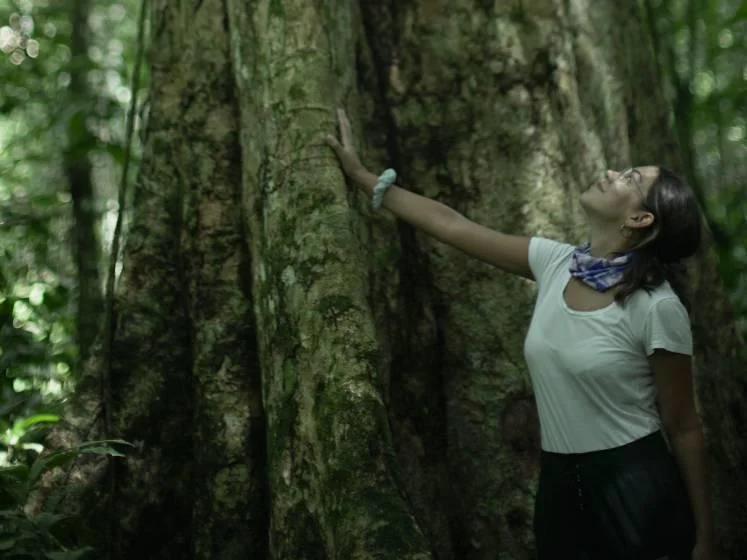Reshaping human activity and behaviour to build a more sustainable world

Maria Alejandra Cantuarias (MSc Psychology of Economic Life and Behavioural Science 2019) is passionate about reshaping businesses for sustainable growth and developing natural climate solutions. She has seven years’ experience in business strategy and marketing consulting and is Chief Marketing Officer at Bosques Amazónicos (BAM).
Tell us about BAM and its mission
BAM is a Peruvian forestry and environmental services company whose purpose is to protect and restore the value of Amazonian ecosystems to fight climate change, preserve biodiversity and contribute to the sustainable development of Peru.
It was founded in 2004 to reduce and prevent deforestation.We do that by restoring the economic value of forests while generating tangible and sustainable opportunities for local communities. Our work is based on three pillars: protect, restore and fund natural climate solutions.
What are the biggest achievements of the organisation so far?
BAM is the most experienced forestry company in the Peruvian Amazon. Its restoration model has been internationally recognized, receiving awards such as the United Nations Award granted by FAO to the best restoration company for degraded areas in Peru. To date, BAM has restored 1,000 hectares of degraded land by planting 850,000 native trees, initiative which has generated hundreds of rural jobs providing valuable employment opportunities for women.
Furthermore, BAM’s REDD+ Brazil nut concessions project in Madre de Dios – one of the most biodiverse places on the planet – was one of the first conservation projects to be validated under de VCS standard, the most prestigious standard in the voluntary carbon market worldwide. With this initiative BAM protects 300,000 hectares of Amazon rainforests in partnership with 405 local families. Since 2009, the Project has protected over 320 million trees, preserved the most extraordinary biodiversity and prevented the emissions of more than 16 million tonnes of CO2 into the atmosphere. REDD+ Brazil nut concessions will prevent the emissions of another 30 million tonnes of CO2 from now until 2040.
BAM’s short-term plans include scaling both restoration and conservation efforts in the region.

What impact has COVID-19 had on the environment?
It is misleading to assume that the pandemic has "given the planet a break". Although global CO2 emissions decreased by 6% in 2020, levels of emissions recover strongly as soon as the economy bounces back. In December 2020 emissions rebounded, rising to 2% higher than in the same month of 2019, even when we had not returned to economic activity at its full potential yet. Furthermore, in 2020, 4.2 million hectares of primary rainforests, an area the size of the Netherlands, were lost. Despite economic downturn, rainforest loss increased 12% compared to 2019. So it is clear that we are not making the necessary changes to build the low-carbon economy we so urgently need.
Our current levels of emissions will not take us to the target limits of the Paris Agreement. We need fundamental changes in human activity, systems and behaviour: how we generate value, how we produce energy, how we feed ourselves, how we use our planet's resources…
Good news is that awareness is growing across governments, organisations and citizens who are firmly assuming their role in the fight against climate change. Now we must channel all these efforts into developing real impact solutions that will move us efficiently towards a low-carbon economy.
Will the pandemic be a turning point for climate change?
COVID-19 has reinforced awareness of the untenable pressure that human activity is putting on nature. The major health and environmental crises we are facing are inextricably linked to the accelerating destruction of wildlife. It’s been widely studied that deforestation and degradation of natural ecosystems are intimately related to zoonotic diseases. This understanding is not new, but we have neglected it for decades. Now that we are suffering the consequences first-hand, it has become a battle that our generation can no longer ignore. The pandemic should be a turning point for climate change: this is the moment for us to react.
What made you decide to develop a career in sustainability?
I was in business consulting before coming to LSE. In my work, I witnessed how companies of all types and sizes promoted development but did not follow a purpose beyond the commercial one. This motivated me to rethink the way we do business and to rethink the general (mis)conception of traditional economic success.
I wanted to redefine my professional purpose to one with a greater impact on society and the environment. At LSE I found the answer I was looking for and beyond, and this led me pursue a career in sustainability.

What led you to study at LSE?
University prestige, specifically in the academic area of my interest: social sciences. LSE is the number one university in Europe and second worldwide for social sciences and its 125-year reputation is admired worldwide.
I was also attracted to the multiculturalism of LSE alumni, and to the opportunity to live in a vibrant international city with people from all around the world. I was convinced that sharing knowledge and experiences with students from over 140 different countries would provide a truly global, competitive experience to grow both personally and professionally.
How has LSE influenced your life and career?
The School’s motto – know the causes of things, for the betterment of society – drives my professional career every day.
LSE, and specifically the master's degree I completed, teaches students to understand and shape economic behaviour, beyond homo economicus (economic man), for making the world a better place. I am convinced this is exactly what we need right now, more leaders rethinking human development to create a better world for future generations.
Besides professors such as Saadi Lahlou, Frédéric Basso or Kate Laffan, and the LSE spirit in general, what influenced me the most were undoubtedly my classmates. They are a group of extraordinary people and brilliant professionals from all over the world with one thing in common: they put their capabilities and experiences to contribute to a greater purpose. Their selfless approach to success and genuine ambition to make a real impact, combined with a disruptive vision for the future, was what inspired me to take a professional turn towards environmental sustainability.
What contribution LSE alumni can make in creating a more sustainable world?
LSE is known for bringing together outstanding professionals and leaders from all over the world who specialise in different areas of science. Graduating from such a diverse and cosmopolitan institution, LSE alumni can drive knowledge, experiences and relations for creating science-based sustainable solutions to build the world we envision for the future.
April 2021
Are you an LSE alumni working in the field of sustainability? LSE’s sustainability team is keen to showcase alumni profiles to inspire students. To be considered, contact the Sustainability team with a brief introduction to your current role.